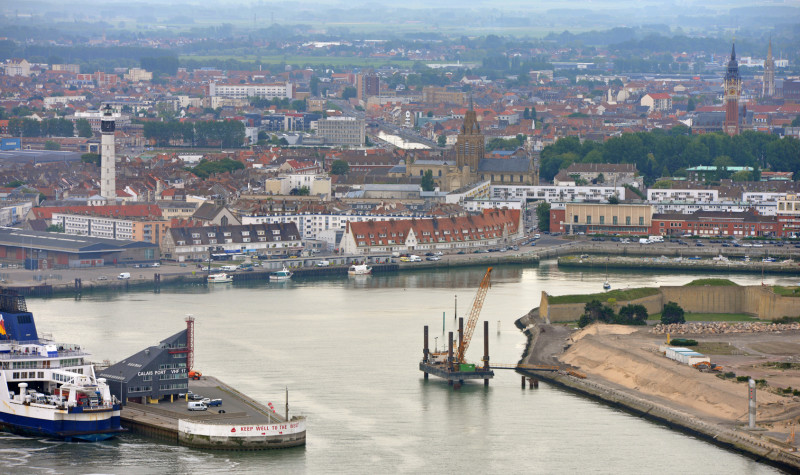The Trouble with Calais

“When I am dead and opened, you will find Calais written on my heart.” – Queen Mary I
This situation in Calais is not getting better – for anybody. Our truck drivers are daily running a gauntlet of missiles and human obstacles; the French police are at wit’s end; the good burghers of Calais are at the end of their tether; innocent Brits driving down to the Dordogne go in fear; and the condition of the wannabe asylum seekers who inhabit The Jungle is miserable. How long will this continue?
I don’t know. Indefinitely, perhaps; or until sufficient political will is shown to do something. The de facto dismantling of Schengen, now in process, will certainly help. Now that we know that the mastermind of the Paris massacre spent most of this year swanning around Europe with impunity, it seems that Europe needs more frontiers right now, not fewer (even if that is an unfashionable sentiment in some quarters).
I could point a finger at the French authorities who seem reluctant to enforce French law on French territory. But I won’t. I’d just like to point out a little strategic fact which nobody seems to have mentioned. In times past our island nation enjoyed many and varied links with the continent for freight, car passengers and foot passengers. Yet, over time, most routes have been allowed to go under, leaving the Dover-Calais route as the overwhelmingly important link between the UK (and Ireland, by the way) and the rest of Europe.
True, Dover-Calais is the shortest distance between the two land masses. Which is why they built the tunnel there. From the cliffs at St. Margaret’s Bay, a famous beauty spot in Kent, on a summer’s day, it is as if you can almost touch the coast of France on the other side of the water. My father, an RAF pilot in WWII, claimed to be able to tell the time on the clock tower of Calais town hall from Deal pier. (I obviously didn’t inherit his keen eyesight).
But why has the Folkestone-Boulogne route been allowed to die the death? Or the Harwich-Hook of Holland route, which was a favourite for brave British holiday-makers making their way to Scandinavia; or Newcastle-Rotterdam; or Harwich-Esbjerg (Denmark); or Queenstown (on Kent’s scenic Isle of Sheppey – please don’t laugh) to Vlissingen (Holland); or Ramsgate-Ostend (despite a spanking new ferry terminal – a scandal, in my book)?
All these routes have been culled. So now, all the traffic they would have carried is routed down the M2/M20 to Dover and thence to Calais. True, routes such as Newhaven-Dieppe, Portsmouth-St. Malo and others still run from the South coast. But if you are transporting an engine component from Daventry to Stuttgart, they are not much help. (There is also still the Cobelfret RORO service for container trucks which runs from the QEII (Dartford) Bridge to Rotterdam, daily).
So the bloodstream of British foreign trade is unhealthily dependent on one particular artery of commerce. A classic case of over-concentration, where diversification is required. How could those far-sighted strategic planners in Whitehall, those polyglot mandarins with their double firsts in Classics from Cambridge, have possibly allowed this to happen?
Let me give you one good reason.
The Channel Tunnel was the mother of French grands projets which of course required huge amounts of state-sourced investment and legal privilege (an international treaty, no less). The tunnel itself was only part of the scheme. Then came, of course, the upgraded motorways and the fast trains (HS1). The massive EU and UK funding gave Dover-Calais an overwhelming competitive advantage.
Then the EU bureaucrats took away the only financial perk that kept the other ferry ports in business: duty free booze and fags. If Jersey is VAT-free, why not the Goodwin Sands? But no; the men in suits demurred.
Other English ports compete with the Channel Tunnel/Dover on a level playing field that resembles the Black Run at Zermatt. And by the way, the Channel Tunnel, especially the Eurostar service, almost uniquely benefits the rich. The good people of Kent (actually one of England’s poorer counties) have benefited precious little – apart from the green-field building boom around Ashford, which has now run out of steam. The main beneficiaries are the City types who speed to sumptuous lunches in Paris without spending a penny in the Garden of England.
The solution? It might sound drastic but closing the Channel Tunnel would not only solve the Calais problem, it would also give a boost to George Osborne’s Northern Powerhouse. Liverpool, the great portal of the British Empire, might once again thrive. (Actually, its cruise terminal is doing a brisk trade already). Hull, that pearl of the North, might be rejuvenated. Harwich might once again buzz.
If you have shares in Eurotunnel (LON:GETS), I am so sorry. But then, it’s been a pretty horrible investment anyway.
Somewhere along the line, those mandarins in Whitehall outsourced our strategic planning to the French. They should have the letters CALAIS tattooed on their hearts. Where one big fish is favoured, many small ones die. Beware of Frenchmen bearing grand projets.
Comments (0)